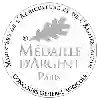
Winery Choix de RimayRouge
This wine generally goes well with
Details and technical informations about Winery Choix de Rimay's Rouge.
Discover the grape variety: Chenin
Chenin, also known as pinot de la Loire Valley (pineau), is the flagship grape variety of the Loire Valley. It would have found its first origins in Anjou where it would have been cultivated by the monks of the Abbey of Saint-Maur located between Angers and Saumur since the 6th century. chenin is a great white grape variety which likes particularly the chalky soils called here stones of tufa which were used for the construction of the castles of the Loire Valley. Its bunches are medium-sized, fairly compact and its berries are more or less small. It is an early variety, which resists well to diseases. Chenin has the particularity of being able to participate as well in the elaboration of dry white wines as of sweet white wines or sparkling wines. Perfectly structured by the acidity, elegant, with a complex nose and aromas of yellow fruits, dry fruits, citrus fruits, white flowers, honey... the wine resulting from the chenin is rather lively and nervous, which allows him a good potential of guard. Chenin covers about 10,000 hectares in France, and is very productive in South Africa where it covers more than 26,000 hectares.
Informations about the Winery Choix de Rimay
The Winery Choix de Rimay is one of of the world's greatest estates. It offers 5 wines for sale in the of Haut-Médoc to come and discover on site or to buy online.
The wine region of Haut-Médoc
The wine region of Haut-Médoc is located in the region of Médoc of Bordeaux of France. Wineries and vineyards like the Château Lestage Simon or the Château La Lagune produce mainly wines red, white and pink. The most planted grape varieties in the region of Haut-Médoc are Cabernet-Sauvignon, Merlot and Cabernet franc, they are then used in wines in blends or as a single variety. On the nose of Haut-Médoc often reveals types of flavors of leather, sour cherry or almonds and sometimes also flavors of chalk, hay or orange.
The wine region of Bordeaux
Bordeaux, in southwestern France, is one of the most famous, prestigious and prolific wine regions in the world. The majority of Bordeaux wines (nearly 90% of the production Volume) are the Dry, medium and Full-bodied red Bordeaux blends for which it is famous. The finest (and most expensive) are the wines of the great châteaux of Haut-Médoc and the right bank appellations of Saint-Émilion and Pomerol. The former focuses (at the highest level) on Cabernet Sauvignon, the latter on Merlot.
The word of the wine: Chopine
Small bottle with a capacity of 50 centilitres.










